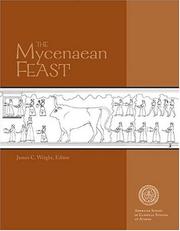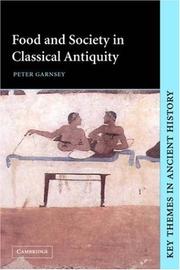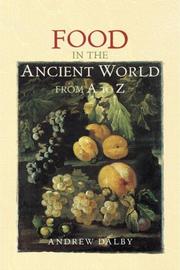| Listing 1 - 7 of 7 |
Sort by
|
Book
ISBN: 9780876615492 0876615493 1621390217 9781621390213 Year: 2015 Volume: 49 Publisher: Princeton, N.J.: American school of classical studies at Athens,
Abstract | Keywords | Export | Availability | Bookmark
 Loading...
Loading...Choose an application
- Reference Manager
- EndNote
- RefWorks (Direct export to RefWorks)
Prehistoric peoples --- Diet --- Food habits --- Human remains (Archaeology) --- Food --- History --- Prehistoric peoples - Food - Greece --- Diet - Greece - Crete --- Food habits - Greece - History --- Human remains (Archaeology) - Greece
Book
ISBN: 9789042933040 9042933046 Year: 2016 Volume: 354 Publisher: Bruxelles: Latomus,
Abstract | Keywords | Export | Availability | Bookmark
 Loading...
Loading...Choose an application
- Reference Manager
- EndNote
- RefWorks (Direct export to RefWorks)
Food habits --- Diet --- Ethnic relations --- Civilization, Ancient --- Habitudes alimentaires --- Alimentation --- Relations interethniques --- Civilisation ancienne --- History --- History. --- Histoire --- Greece --- Rome --- Mediterranean region --- Food habits - Greece - History --- Food habits - Rome - History --- Food habits - Mediterranean Region - History

ISBN: 0876619510 9780876619513 Year: 2004 Volume: 73(2) Publisher: Princeton, NJ: American school of classical studies at Athens,
Abstract | Keywords | Export | Availability | Bookmark
 Loading...
Loading...Choose an application
- Reference Manager
- EndNote
- RefWorks (Direct export to RefWorks)
The large-scale, formal consumption of huge quantities of food and drink is a feature of many societies, but extracting evidence for feasting from the archaeological record has, until recently, been problematic. This collection of essays investigates the rich evidence for the character of the Mycenaean feast. While much of the evidence discussed comes from the Palace of Nestor near Pylos, the authors also discuss new material from Tsoungiza near Nemea, and from other Bronze Age sites on mainland Greece and Crete. Textual evidence (from Linear B tablets) for the collection of raw materials, and the stocktaking of equipment, is complemented by discussions of the faunal and artifactual assemblages feasts left behind. Specially commissioned papers put Mycenaean practice in context by comparing it to contemporary activities on Cyprus and in Minoan Crete, while a final chapter compares Bronze with Iron Age Greece, especially as seen through the lens of Homeric epic. This volume offers a rich and detailed collection of evidence, from a variety of sources, for conspicuous consumption in the Mycenaean period. As well as being core reading for Aegean prehistorians, it will be of interest to students of later Greek culture, anthropologists, and other scholars interested in the wider social aspects of eating and drinking.
Civilization, Mycenaean. --- Food habits --- History --- Greece --- Antiquities. --- Civilization, Mycenaean --- Eating --- Food customs --- Foodways --- Human beings --- Habit --- Manners and customs --- Diet --- Nutrition --- Oral habits --- Mycenaean civilization --- Civilization, Aegean --- Food habits - Greece - History - To 1500. --- Greece - Antiquities.
Book
ISBN: 9781407309286 1407309285 Year: 2012 Volume: 2345 Publisher: Oxford: Archaeopress,
Abstract | Keywords | Export | Availability | Bookmark
 Loading...
Loading...Choose an application
- Reference Manager
- EndNote
- RefWorks (Direct export to RefWorks)
Civilization, Mycenaean. --- Food habits --- Dinners and dining --- Bronze age --- Iron age --- Civilisation mycénienne --- Habitudes alimentaires --- Repas --- Age du bronze --- Age du fer --- History --- Histoire --- Greece --- Grèce --- Antiquities --- Antiquités --- Civilization, Mycenaean --- Fasts and feasts --- Antiquities. --- Civilisation mycénienne --- Grèce --- Antiquités --- Fasts and feasts - Greece - History - To 1500 --- Food habits - Greece - History - To 1500 --- Dinners and dining - Greece - History - To 1500 --- Greece - Antiquities

ISBN: 9780521645881 0521645883 0521641829 9780521641821 9780511612534 051117330X 0511066228 0511059914 0511324960 0511612532 1280420421 1139145967 0511068352 1107116260 9780511066221 9780511068355 9780511059919 6610420424 9786610420421 9781280420429 9781139145961 9780511173301 9780511324963 9781107116269 Year: 1999 Publisher: Cambridge Cambridge University Press
Abstract | Keywords | Export | Availability | Bookmark
 Loading...
Loading...Choose an application
- Reference Manager
- EndNote
- RefWorks (Direct export to RefWorks)
This is the first study of food in classical antiquity that treats it as both a biological and a cultural phenomenon. The variables of food quantity, quality and availability, and the impact of disease, are evaluated and a judgement reached which inclines to pessimism. Food is also a symbol, evoking other basic human needs and desires, especially sex, and performing social and cultural roles which can be either integrative or divisive. The book explores food taboos in Greek, Roman, and Jewish society, and food-allocation within the family, as well as more familiar cultural and economic polarities which are highlighted by food and eating. The author draws on a wide range of evidence new and old, from written sources to human skeletal remains, and uses both comparative historical evidence from early modern and contemporary developing societies and the anthropological literature, to create a case-study of food in antiquity.
Civilization, Classical --- Food habits --- Food supply --- 394.12093 --- Food control --- Produce trade --- Agriculture --- Food security --- Single cell proteins --- Eating --- Food customs --- Foodways --- Human beings --- Habit --- Manners and customs --- Diet --- Nutrition --- Oral habits --- Classical civilization --- Civilization, Ancient --- Classicism --- History --- Social sciences Food Ancient World --- Arts and Humanities --- Civilization, Classical. --- Habitudes alimentaires --- Aliments --- Civilisation ancienne --- History. --- Histoire --- Approvisionnement --- Greece --- Rome --- Civilization [Classical ] --- Food habits - Greece - History - To 1500 --- Food habits - Rome --- Food supply - Greece - History - To 1500 --- Food supply - Rome

ISBN: 0415232597 9780415232593 Year: 2003 Publisher: London: Routledge,
Abstract | Keywords | Export | Availability | Bookmark
 Loading...
Loading...Choose an application
- Reference Manager
- EndNote
- RefWorks (Direct export to RefWorks)
Drinking customs --- Rome --- Civilization, Classical --- Food habits --- History --- Social life and customs --- Greece --- 641 --- 931 --- -Drinking customs --- -Food habits --- -Rome --- -Eating --- Food customs --- Foodways --- Human beings --- Habit --- Manners and customs --- Diet --- Nutrition --- Oral habits --- Classical civilization --- Civilization, Ancient --- Classicism --- Voeding. Voedsel--(zie ook {392.8}) --- Oude geschiedenis--in het algemeen --- -Social life and customs --- -Voeding. Voedsel--(zie ook {392.8}) --- 931 Oude geschiedenis--in het algemeen --- -Classical civilization --- Eating --- Social life and customs. --- Drinking customs - Greece - History --- Rome - Social life and customs --- Food habits - Rome - History --- Drinking customs - Rome - History --- Food habits - Greece - History --- Greece - Social life and customs
Book
ISBN: 9782753511286 2753511284 Year: 2010 Volume: *1 Publisher: Rennes : Presses universitaires de Rennes,
Abstract | Keywords | Export | Availability | Bookmark
 Loading...
Loading...Choose an application
- Reference Manager
- EndNote
- RefWorks (Direct export to RefWorks)
Le banquet est une activité représentative des valeurs de l'élite gréco-romaine du IIe siècle apr. J.-C. Il symbolise l'otium (loisir) et la paideia (culture). Le banquet était déjà le cadre de la transmission des normes comportementales et des valeurs de l'élite à l'époque archaïque, en Grèce, par l'entremise des poèmes épiques et lyriques et par l'observation des pratiques des Anciens. A partir du IVe siècle av. J.-C., dans les écoles de philosophie, les manuels de bienséance concourent également à la formation des futures élites politiques et intellectuelles de la Grèce ancienne. A leur époque, Plutarque de Chéronée, Lucien de Samosate et Athénée de Naucratis, par [entremise du banquet littéraire, participent, à leur manière, à la diffusion des connaissances et des bonnes manières. Ils réfléchissent aux manières de table contemporaines en convoquant les autorités littéraires appartenant au passé. Souvent, ils mettent en avant une dégradation des moeurs, faisant preuve d'un préjugé, d'une observation inverse à celle de Norbert Elias pour l'Europe moderne. La thèse du sociologue Elias sur le processus évolutif des bonnes moeurs n'est pas opérante pour [étude des mondes anciens. Au IIe siècle apr. J.-C., à l'époque de l'Empire, les élites grecques et romaines partagent les mêmes loisirs et les mêmes référents culturels. Les banquets grec et romain s'unissent pour former une seule et même institution, un banquet gréco-romain participant à la définition identitaire des élites de l'Empire, comme peuvent l'attester l'apparition de triclinia dans le monde grec et l'introduction de l'épouse grecque au banquet.
Food habits --- Civilization, Classical. --- Dinners and dining --- Habitudes alimentaires --- Civilisation ancienne --- Repas --- History. --- History --- Histoire --- Greece --- Rome --- Grèce --- Social life and customs. --- Moeurs et coutumes --- Vie quotidienne --- --Repas --- --Art de la table --- --Histoire des mentalités --- --Antiquité --- --Rome ancienne --- --Grèce ancienne --- --Food habits --- Civilization, Classical --- Social life and customs --- Anthropology --- Social Sciences --- Manners & Customs --- Grèce --- Art de la table --- Histoire des mentalités --- Antiquité --- Rome ancienne --- Grèce ancienne --- Food habits - Greece - History --- Food habits - Rome - History --- Greece - Social life and customs --- Rome - Social life and customs --- Plutarque (0046?-0120?) --- Lucien de Samosate (0125?-0192?) --- Athénée (rhéteur ; 01..?-02..?) --- Élite (sciences sociales) --- Banquets --- Rites et cérémonies --- Savoir-vivre --- Littérature antique --- Alimentation --- Critique et interprétation --- Thèmes, motifs --- Éducation --- Aspect social --- Dans la littérature
| Listing 1 - 7 of 7 |
Sort by
|

 Search
Search Feedback
Feedback About UniCat
About UniCat  Help
Help News
News